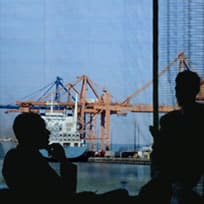Global Finance selects the leaders in a specialized area of finance that is undergoing a jarring transformation.

Shifting global trade patterns and stronger supply chains linking the Wal-Marts of the world with their overseas suppliers are challenging trade finance banks to devise new ways of doing business. ABN Amro of the Netherlands, for example, confirmed a letter of credit in October 2005 issued by Karachi-based Metropolitan Bank for the import of canola into Pakistan. By confirming the letter of credit, the Dutch bank obligated itself to make payment to the supplier once appropriate documents were presented as evidence of delivery of the goods. This was the first transaction completed under the International Finance Corporations Global Trade Finance Program. The IFC provided a guarantee covering 80% of the risk involved in the transaction.
As emerging markets increase their share in world merchandise trade, banks are increasingly being asked by their customers to expand their trade finance services into new and often more-challenging countries. Guarantees provided by the IFC, the private-sector lending arm of the World Bank, are designed to encourage commercial banks to take on these added risks in a growing range of countries.
JPMorgan Chase was another one of the first banks to join the Global Trade Finance program last September. With an already robust emerging markets business in place, we will now be able to develop our exposure in these markets even further through the trade channel established by the IFC program, says Stacey Facter, global head of trade credit insurance for the treasury services business at the New York-based bank.
Meanwhile, trade finance banks are being challenged on another front. The volume of bank-guaranteed letters of credit is declining, and a growing share of world trade is being done on open-account terms without relying on banks as intermediaries. Under open account, a major importer with an established relationship with an overseas supplier simply agrees to pay for a shipment at a future date. The importer is not required to have its bank issue a letter of credit guaranteeing payment.
Not wanting to be squeezed out of this business, banks have responded by developing online platforms that enable their trade customers to gain the efficiencies of open-account transactions without giving up the security of payment guarantees. New programs have been developed to take information from purchase orders to create electronic letters of credit. The major trade finance banks are entering into alliances with third-party providers of logistics and transportation services. This enables importers and exporters to manage their trade and payment flows from a single online site run by their bank or by a non-bank service such as TradeCard.
Calyon, the corporate and investment banking unit of French bank Crdit Agricole, agreed last year to sell the TradeCard platform and provide customer service for the system throughout Europe. Calyon will use its global network to sell both TradeCard and its own financial services to export customers.
In our sixth annual survey of the Worlds Best Trade Finance Banks, Global Finance editors, with input from industry analysts, corporate executives and technology experts, chose the leading trade finance banks in 44 countries and five regions, as well as the best online trade finance provider.
Criteria for choosing the winners included transaction volume, scope of global coverage, customer service, competitive pricing and innovative technologies.
See owr award winners
Gordon Platt



